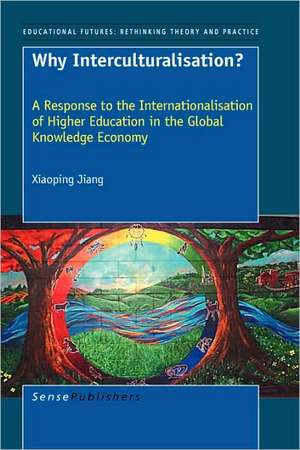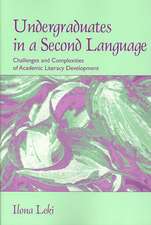Why Interculturalisation?
Autor Xiaoping Jiangen Limba Engleză Hardback – 3 noi 2008
| Toate formatele și edițiile | Preț | Express |
|---|---|---|
| Paperback (1) | 395.89 lei 38-44 zile | |
| Brill – 31 dec 2007 | 395.89 lei 38-44 zile | |
| Hardback (1) | 566.53 lei 38-44 zile | |
| Sense Publishers – 3 noi 2008 | 566.53 lei 38-44 zile |
Preț: 566.53 lei
Preț vechi: 699.42 lei
-19% Nou
Puncte Express: 850
Preț estimativ în valută:
108.41€ • 113.42$ • 90.05£
108.41€ • 113.42$ • 90.05£
Carte tipărită la comandă
Livrare economică 29 martie-04 aprilie
Preluare comenzi: 021 569.72.76
Specificații
ISBN-13: 9789087906658
ISBN-10: 908790665X
Pagini: 200
Dimensiuni: 156 x 234 x 13 mm
Greutate: 0.46 kg
Editura: Sense Publishers
Locul publicării:Netherlands
ISBN-10: 908790665X
Pagini: 200
Dimensiuni: 156 x 234 x 13 mm
Greutate: 0.46 kg
Editura: Sense Publishers
Locul publicării:Netherlands
Descriere
Descriere de la o altă ediție sau format:
This amazing, highly readable book breaks a new ground in revealing the dominant theories and policies that have had profound effects on the strategies to accommodate cultural diversity on university campus. Few have researched intercultural communication from macro to micro perspectives and applied a multidisciplinary approach by drawing on research from disciplines such as sociology, economics, politics, social psychology, management, communication, culture and language. This book has outlined an emerging concept of some considerable significance, interculturalisation, from a variety of contemporary perspectives, and indicated its conceptual potential in understanding the impact of higher education on globalisation, internationalisation and the knowledge economy. The book has also provided a critical assessment of the issues in globalisation and the internationalisation of higher education such as the homogenisation of cultures and the dominance of economic imperatives. In general, this book represents an original application of specialist literatures that develops certain theorisations and understandings together for the first time in a new constellation. Hence, the book provides an excellent contribution to the current interest in globalisation across disciplines, particularly to the research in intercultural communication.
It should be of great interest to philosophers, educators and researchers in the intercultural studies. This book is a significant and powerful work that is sure to invigorate interesting discussions of higher education and particularly intercultural education for years to come.
The publication of this book announces the emergence of an original approach to intercultural communication that scholars around the world will soon to appreciate.
This amazing, highly readable book breaks a new ground in revealing the dominant theories and policies that have had profound effects on the strategies to accommodate cultural diversity on university campus. Few have researched intercultural communication from macro to micro perspectives and applied a multidisciplinary approach by drawing on research from disciplines such as sociology, economics, politics, social psychology, management, communication, culture and language. This book has outlined an emerging concept of some considerable significance, interculturalisation, from a variety of contemporary perspectives, and indicated its conceptual potential in understanding the impact of higher education on globalisation, internationalisation and the knowledge economy. The book has also provided a critical assessment of the issues in globalisation and the internationalisation of higher education such as the homogenisation of cultures and the dominance of economic imperatives. In general, this book represents an original application of specialist literatures that develops certain theorisations and understandings together for the first time in a new constellation. Hence, the book provides an excellent contribution to the current interest in globalisation across disciplines, particularly to the research in intercultural communication.
It should be of great interest to philosophers, educators and researchers in the intercultural studies. This book is a significant and powerful work that is sure to invigorate interesting discussions of higher education and particularly intercultural education for years to come.
The publication of this book announces the emergence of an original approach to intercultural communication that scholars around the world will soon to appreciate.








